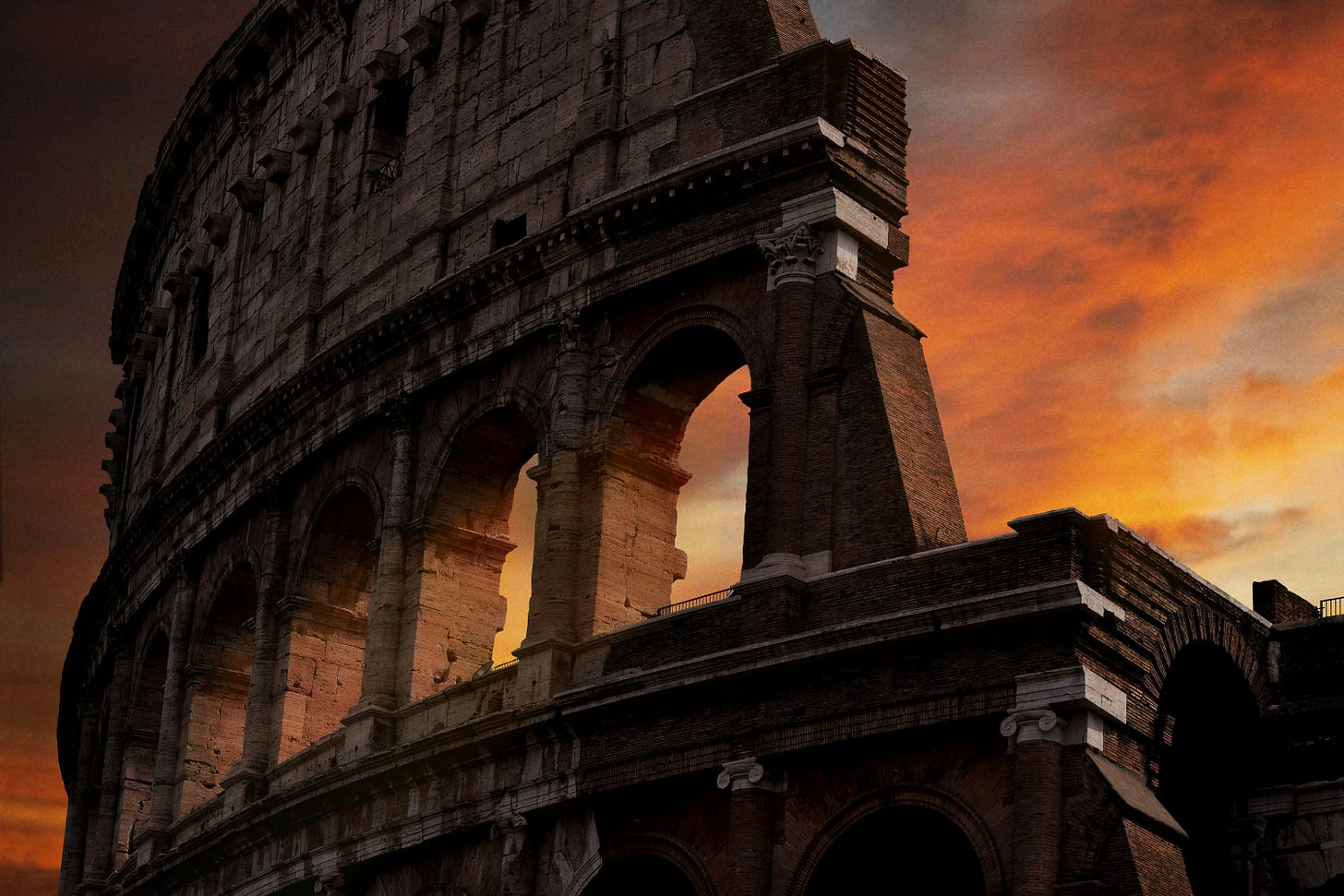
Contentment. It sounds simple, maybe even idyllic—something we’re all supposed to strive for, right? But in a world that feels increasingly chaotic, is it truly responsible to focus on our own “good enough” lives? Isn’t choosing contentment a bit self-indulgent when, in so many ways, Rome seems to be burning?
Let’s go back a couple of thousand years to the story of Emperor Nero, who famously (if not factually) fiddled while Rome was engulfed in flames. History has not been kind to him—his name is almost synonymous with self-absorbed neglect. But here’s my question: Was Nero merely a textbook narcissist? Or could he have been, perhaps, a proto-zen master who knew something about the limits of control that the rest of us still struggle to grasp?
Maybe, as Rome was burning, he understood that the only thing he could truly govern was his own experience. Maybe he was simply creating a brief moment of beauty amid the chaos, embracing the only “good enough” he had. Was he an uncaring tyrant, or did his music offer a fleeting solace to anyone who heard it?
The “Special Meter” and the Need to Be Noteworthy
This notion of choosing contentment brings up uncomfortable questions, perhaps because many of us measure our lives against an internal “special meter.” You know, that insistent gauge that’s always assessing whether what we’re doing is extraordinary enough. And if we’re honest, just “living” doesn’t always feel sufficient. It feels like auditioning as an extra on a movie set instead of going for the lead role.
I’ve spent years wrestling with the feeling that I’m supposed to be doing more. Something noteworthy. Impactful. Maybe even extraordinary. On days when I don’t feel remarkable, that nagging thought creeps in: Am I wasting my potential? Should I be reaching for more? This relentless striving makes “good enough” seem like settling, even when it may be exactly what I need.
Is Contentment Irresponsible?
Which brings me back to Nero. Let’s say we’re all, in a way, living in a burning Rome. We’re surrounded by global problems, glaring injustices, and issues that deserve attention. Isn’t it irresponsible to tune out and focus on finding peace in our small corners?
Choosing contentment can feel reckless, like fiddling while the world burns. Shouldn’t we be doing more, caring more, achieving more? But perhaps there’s another side to this. Maybe finding contentment isn’t neglectful but courageous. Maybe it’s about creating moments of beauty and peace precisely because the world feels chaotic. After all, the notion that we can single-handedly fix everything is as unrealistic as it is exhausting.
People who truly impact the world are rarely motivated by a desire to be “special” but by a quiet resolve to address the things they cannot ignore. Potential comes from the Latin root potentia, meaning “power.” What power do we genuinely hold—not for greatness, but for authenticity and meaningful action?
The Trap of “Potential” and the Myth of Being Special
Potential is one of those strange concepts—vague yet loaded with expectation. It’s like being handed a blank check with an undefined promise of greatness attached. But who defines what this greatness is? The more I think about it, the more I realize my obsession with “living up to my potential” is less about destiny and more about my own insecurities.
After all, potential is a construct, a yardstick that can be moved as often as we choose. Measuring ourselves against this abstract ideal is bound to leave us feeling inadequate. The real question is: do we need to keep chasing it?
What if my purpose isn’t to achieve some vague notion of greatness but to find genuine peace within myself? If I’m honest, finding contentment feels like a far greater challenge than chasing specialness ever was. It feels risky, even indulgent, but also, somehow, like the bravest thing I could do.
Blame It on the Bible
I suppose I could blame some of this on the Bible. Growing up Catholic, I heard plenty of parables that seemed designed to set the “special meter” to high alert. Take the story of the servants given talents (coins) by their master and told to invest them wisely. The one who buried his coin was reprimanded harshly. Or the parable about not hiding your lamp under a bushel, lest you waste the gifts you’re meant to share with the world. The message felt clear: if you aren’t shining brightly or multiplying your talents, you’re falling short.
What kind of society do we create with a culture rooted in stories make us feel that our worth is constantly under review? When the Dalai Lama first came to America and was first introduced to the concept of self-hatred, he reportedly didn’t understand the question. The idea that one’s greatest adversary could be within oneself was foreign to him. What a contrast to my own upbringing, where I was taught to scrutinize my shortcomings as though my soul were a project in constant need of improvement.
This leads me to wonder if contentment and self-acceptance aren’t just personal battles but cultural ones. What if it’s okay to be as we are? What if the lamp doesn’t need to be dazzling, and the coin doesn’t need to double? What if, instead of striving for greatness, we’re meant to find peace in the quiet light we already hold?

Learning to Play My Own “Fiddle”
So here I am, asking myself the age-old question: Who’s really keeping score? If I step off the hamster wheel of endless striving and embrace contentment, does that make me a modern-day Nero? Maybe. Or maybe I’m simply choosing to play my own “fiddle”—to make a little music that brings meaning, even if it’s only for me.
For you see, at the heart of this need to be “special” isn’t just some egotistical posturing. It’s the deeply vulnerable and quiet awareness that our time here is brief. The older we get, the more real it feels that we’ll eventually fade from memory, our lives erased by time. And even though we know we can’t escape that irrelevance, something in us longs to leave a mark—a small reminder that we were here.
But what if living a “good enough” life isn’t about settling, but rather a quiet act of rebellion against the constant push to be more? Letting go of my “special meter” might just be the surest way to find peace. After all, our lives can be like a piece of music or a canvas—a unique creation that doesn’t need to be grand or remembered by all to have value. Perhaps, as Mary Oliver beautifully wrote, letting “the soft animal of your body love what it loves”—and who it loves—is the most honest legacy we can leave. And maybe, just maybe, allowing ourselves to live in this fullness is enough.






Almost every paragraph of this post prompted me to want to reply. Since I haven't the time to type out all my thoughts (and I'm sure you haven't the inclination to read them), I will limit myself to the two which jumped out at me:
1) When you wrote "people who truly impact the world are ...motivated by...a quiet resolve to address the things they cannot ignore", I immediately thought of Malala Yousafzai, one of my personal heroes. I don't know that I would have ever known anything about her if she had not been a 15 year old girl who stood up for her right to go to school and was subsequently shot. She addressed the lack of access to education for herself by insisting on attending school, and then she addressed those violently trying to stop other girls by taking her fight to a larger audience. Her quiet resolve has made a huge impact.
2) No matter how much care and effort any one of us put into this world, even those of us like Malala who manage to effect real and significant change, each of us, as individuals, are so insignificant in the grand scheme of things that we are unlikely to be remembered past a few generations-unless, of course, we do something as tone deaf as Nero and become a cautionary tale ;)
Thoughtful post!
Your graffiti wall picture ending is grand!
"But what if living a 'good enough' life isn’t about settling, but rather a quiet act of rebellion against the constant push to be more?" Exactly !
In her book Things Are Going Great In My Absence, Lola Jones invites us to not go down in the well with the other people that are struggling down in the well.
Her take on life is that if we stay in a place of goodness, balance, and contentment, even if we aren't rip roaring high flyers and just common, everyday, ordinary people, which is what most of us are, that our essence can impact the world around us.
(BTW Maureen.... you make writing look easy. And that run-on sentence with 25 commas above is a mess and shows why you are currently publishing and I am not 😹)